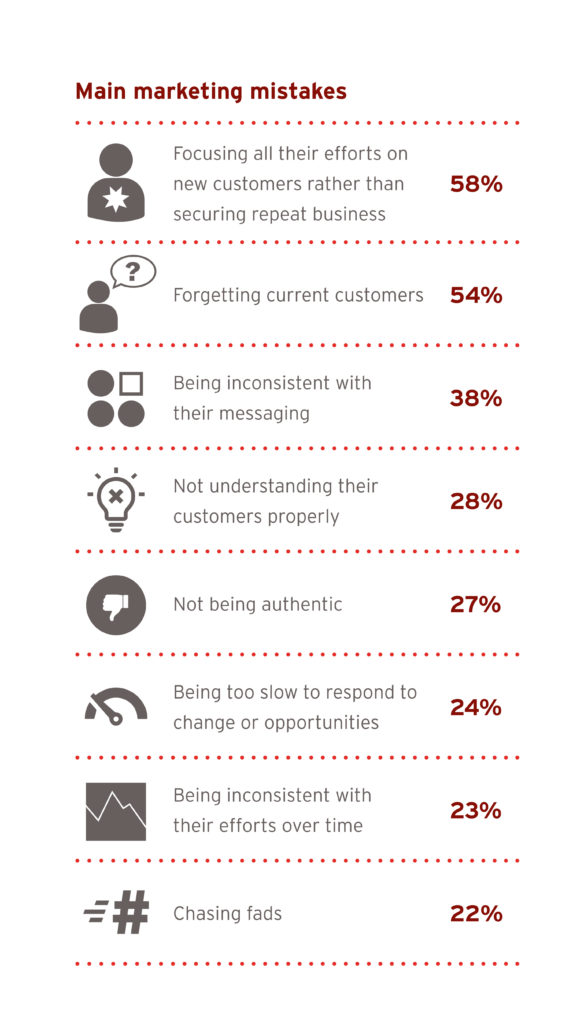
Love for a brand has a massive impact on customer loyalty and recommendations according to a new study. People who love a brand are three times more likely to recommend it to others and will tolerate it making twice as many mistakes as any other, before taking their custom elsewhere. Indeed, according to the Brand Love report, such a brand can mess up almost five times and people will still stay loyal to it.
The research, which was carried out by Energy PR among over 100 top marketers, identifies what it takes to create a great brand and what more is needed if it’s to be loved. According to the marketing experts, contrary to popular opinion, being original isn’t that important when it comes to greatness. Despite the success of brands such as Apple and Tesla, only 17% of marketers think that uniqueness is important, and just 1 in 10 (11%) believe a brand’s greatness is determined by its level of innovation. Instead, they argue the key ingredients for greatness are trust (60%) and how a brand makes a consumer feel (58%). These out-perform even practical considerations such as customer support (34%) and value for money (33%).
Even if a brand achieves greatness, this is no guarantee that it will be loved according to the Brand Love report. To be loved involves a greater level of intimacy; over half of the marketers studied suggest a loved brand is aligned to the customer’s values (55%), indeed it must be part of their life according to 42%. Over a third (38%) went further, adding that such a brand needs to be closely tied with the customer’s identity.
 The Brand Love report also identifies intriguing quirks of consumer behaviour which brand owners must consider. Firstly, many could be mistaking apathy for loyalty as according to the study on average consumers are incredibly apathetic – willing to tolerate an average of two mistakes from even an ordinary brand before being compelled to shop around. This passivity could be enabling a lot of inferior customer service to go unpunished. The flip side is that once such passive customers are eventually lost, winning them back will be incredibly difficult.
The Brand Love report also identifies intriguing quirks of consumer behaviour which brand owners must consider. Firstly, many could be mistaking apathy for loyalty as according to the study on average consumers are incredibly apathetic – willing to tolerate an average of two mistakes from even an ordinary brand before being compelled to shop around. This passivity could be enabling a lot of inferior customer service to go unpunished. The flip side is that once such passive customers are eventually lost, winning them back will be incredibly difficult.
Brand Love also identifies a ‘recommender gene’ which some people simply do or don’t have, and which will overrule how they feel about a brand; for instance, even among the consumers who love a brand, 10% will still not recommend it (or any other). Contrarily 30% of people who are not that committed to any brand will still happily recommend brands to others.
When it comes to the most common mistakes brands make on the path to greatness and love, these centre around neglecting the feelings of customers by focussing solely on new customers (58%), forgetting current customers (54%), being inconsistent with messaging (28%), failing to understand customers properly (28%) and not being authentic (27%).
Louise Findlay-Wilson, Managing Director of Energy PR, which conducted the study comments: “A key take away from our research is that the best brands aren’t necessarily great innovators, but, if you read between the lines, they are all great communicators. Without communications you will struggle to demonstrate your values or become part of someone’s life and identity.
“Communications are an effective way to show customers you ‘get them’, you care and to make them feel good. And once the customer loves you, those communications are still crucial. As our research shows, a consumer may tolerate a brand they love messing up, but they won’t tolerate it neglecting them in favour of new customers. That’s a massive betrayal of that all-important trust. That’s why great communications remain key.”
To download your copy of the Brand Love report, click here.









